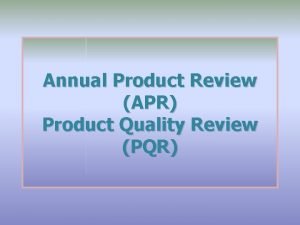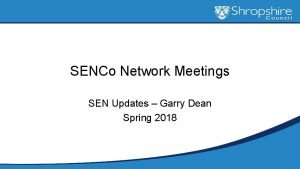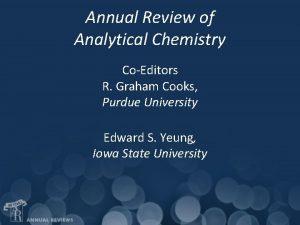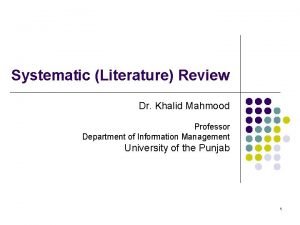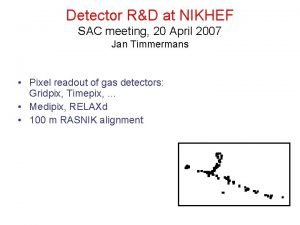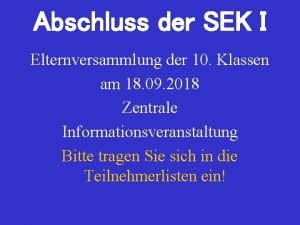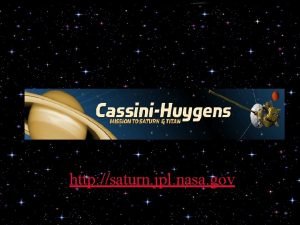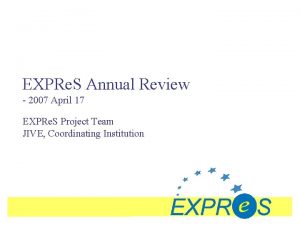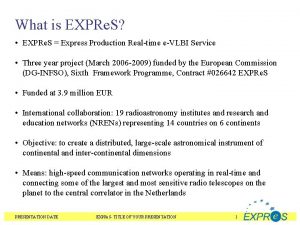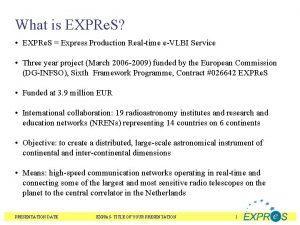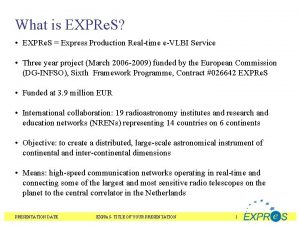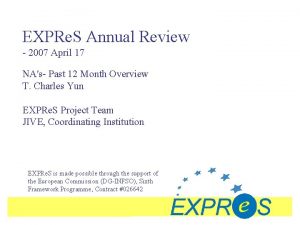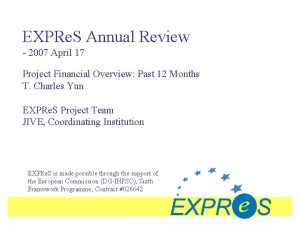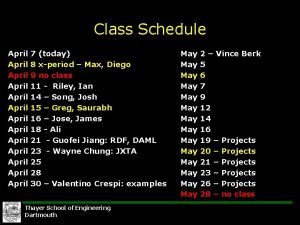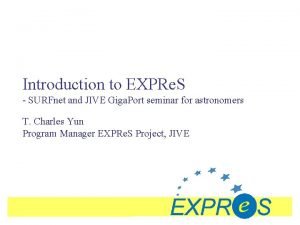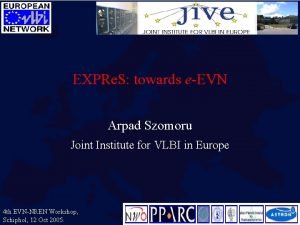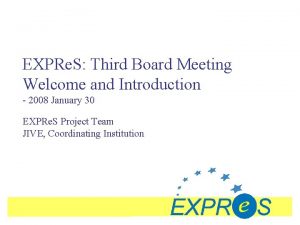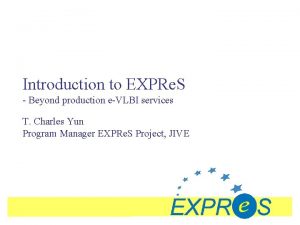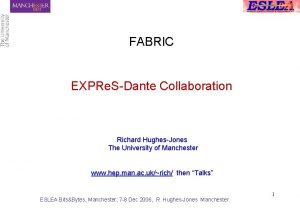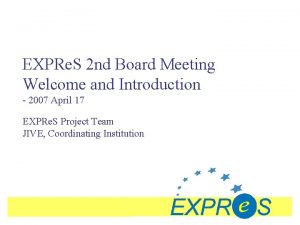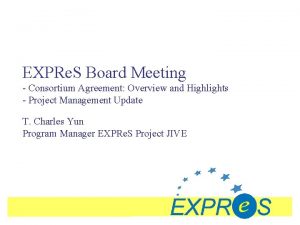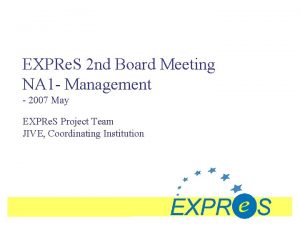2007 April 17 EXPRe S Annual Review 1























- Slides: 23

2007 April 17 EXPRe. S Annual Review 1

EXPRe. S Annual Review - 2007 April 17 EXPRe. S Project Team JIVE, Coordinating Institution

Agenda 09: 00 -09: 30 Introductions / Overview 10 mins. Introductions, Huib Jan van Langevelde, Coordinator 20 mins. EXPRe. S Overview, Ari Mujunen, Chairman 09: 30 -11: 00 EXPRe. S Summary for Past 12 Months 11: 00 -11: 15 Break 11: 15 -11: 45 External User: Benefits and capabilities of e-VLBI 11: 45 -12: 30 Comments from E. C. on morning 12: 30 -13: 15 Lunch 13: 15 -14: 00 Financial Overview for Past 12 Months 14: 00 -15: 15 Overview of project next 18 Months 15: 15 -16: 00 Open Discussion 16: 00 -16: 20 Reviewer Internal Meeting 16: 20 -16: 30 First Feedback to the team 16: 30 Conclusion / End of First Year Review 2007 April 17 EXPRe. S Annual Review 3

Overview What is EXPRe. S? • EXPRe. S = Express Production Real-time e-VLBI Service • Three year project, started March 2006, funded by the European Commission (DG-INFSO), Sixth Framework Programme, Contract #026642. • Objective: to create a distributed, large-scale astronomical instrument of continental and inter-continental dimensions. • Means: high-speed communication networks operating in realtime and connecting some of the largest and most sensitive radio telescopes on the planet. 2007 April 17 EXPRe. S Annual Review 4

Overview EXPRe. S’ Goal The overall objective of EXPRe. S is to create a productionlevel, real-time, “electronic” VLBI (e-VLBI) service, in which the radio telescopes are reliably connected to the central supercomputer at JIVE in the Netherlands, via a high-speed optical-fibre communication network. . . - or Make e-VLBI routine, reliable and realistic for astronomers. 2007 April 17 EXPRe. S Annual Review 5

Overview Why e-VLBI? • To get more and potentially better scientific results much faster than with traditional VLBI. • e-VLBI: • Dramatically shortens the delay between observations and the resulting images. • From months to days or hours. • Can offer more frequent and reliable observations with potentially more bandwidth * observation time. • Ensures data quality already during observations, relaxes storage requirements for raw noise data. • Enables a new class of fast response and reactive observations. 2007 April 17 EXPRe. S Annual Review 6

Introduction Activities # PC NA 1 NA 2 NA 3 NA 4 SA 1 SA 2 JRA 1 2007 April 17 Description Leader Project Coordinator Huib Jan van Langevelde, JIVE Management of I 3 T. Charles Yun, JIVE EVN-NREN Forum John Chevers, DANTE e. VLBI Science Forum John Conway, Chalmers Public outreach Kristine Yun, JIVE Production Services Arpad Szomoru, JIVE Network provisioning Francisco Colomer, CNIG-IGN FABRIC Huib Jan van Langevelde, JIVE EXPRe. S Annual Review 7

Introduction Management Organogram 2007 April 17 EXPRe. S Annual Review 8

Overview EXPRe. S Partners • • • • • Joint Institute for VLBI in Europe (coordinator) AARNET Pty Ltd. , Australia ASTRON, the Netherlands Centro Nacional de Informacion Geografica, Spain Chalmers Tekniska Hoegskola Aktiebolag, Sweden Commonwealth Scientific and Industrial Research Organization (CSIRO), Australia Cornell University, USA Delivery of Advanced Network Technology to Europe Ltd. (DANTE), UK Instituto Nazionale di Astrofisica, Italy Instytut Chemii Bioorganicznej PAN, Poland Max Planck Gesellschaft zur Foerderung der Wissenschaften e. V. , Germany National Research Foundation, South Africa Shanghai Astronomical Observatory, Chinese Academy of Sciences, China SURFNet b. v. , The Netherlands Teknillinen Korkeakoulu, Finland The University of Manchester, UK Universidad de Concepcion, Chile Uniwersytet Mikolaja Kopernika, Poland Ventspils Augstskola, Latvia 2007 April 17 EXPRe. S Annual Review 9

Overview Telescopes participating in EXPRe. S 2007 April 17 EXPRe. S Annual Review 10

Overview e-VLBI, Radio Astronomy • A radio telescope looks at an object in the sky and collects data to create an “image” of the source. • Multiple telescopes can view the same object. The distance between the telescopes is the baseline. The baseline can be compared to building a single telescope with the diameter comparable to this distance. • Correlation is the process by which data from multiple telescopes is collected and combined to create a more accurate image. The correlator is a super computer, extracting interferometry information from the raw radio noise data. • The level of detail in images increases with the data collection rate. Higher data rates are better; higher resolution is better. 2007 April 17 EXPRe. S Annual Review 11

Introduction Aperture Synthesis Imaging • A technique that uses a number of telescopes to simulate a much larger one. A larger dish, real or simulated, improves image clarity and brightness. This requires coordination between the telescopes and a supercomputer. Consider the examples displaying aperture size, aperture distribution and image quality. 2007 April 17 EXPRe. S Annual Review 12

Introduction Correlation 2007 April 17 EXPRe. S Annual Review 13

Overview Data Flow Soon Today Results Today Past 2007 April 17 EXPRe. S Annual Review 14

Overview Benefits of e-VLBI • Improved Science • Speed of analysis • From months to days or hours • Operational reliability • Test data quality during observation • Targets of Opportunity (To. O) and transients • Responsiveness is only available with the immediate analysis provided by e-VLBI • Intellectual collaboration across disciplines • Shared investment in infrastructure vs. new dishes • International cooperation 2007 April 17 EXPRe. S Annual Review 15

Introduction EVN Proposals Received 2007 April 17 EXPRe. S Annual Review 16

4 -5 slides that summarize the “green” 2007 April 17 EXPRe. S Annual Review 17

Fulfilling Objectives Operational e-VLBI network • Results: • Monthly e-VLBI sessions • Publication of peer reviewed, scientific papers • JIVE connectivity in place (7 x 1 Gbps, 10 Gbps and additional connectivity plans in place with SURFnet) • Improvements in data processing time • Providing initial analysis before observation is complete 2007 April 17 EXPRe. S Annual Review 18

Fulfilling Objectives Additional European telescopes • Previously connected: • Arecibo, Jodrell Bank, Westerbork, Onsala, Torun, Cambridge • Newly Connected: • Medicina, Metsahovi • Soon to be connected: • Yebes, Effelsberg, Shanghai 2007 April 17 EXPRe. S Annual Review 19

Fulfilling Objectives Connect telescopes outside Europe • Arecibo • Connectivity from the island to mainland remains a hurdle. Some progress via new capacity. • Australia • Local connections and hardware in place. • China • Lightpath is in place, currently testing the connection. • Chile • The international link supported the SMART-1 observation, but additional optimizations necessary. 2007 April 17 EXPRe. S Annual Review 20

Fulfilling Objectives Rapid Response Science • Currently advertising and routinely performing 256 Mbps from 6 stations. • Possible to obtain 512 Mbps from these stations, but not yet operationally advertised. • Addressing the 1024 Mbps vs. 1 Gbps issue (the “octave” problem) with 10 Gbps lightpaths and experimenting how to achieve 896 Mbps. • Current offer of 2 day rapid turnaround observations, existing 24 hour turnaround. • Current discussion on the To. O acceptance by the EVN. 2007 April 17 EXPRe. S Annual Review 21

Fulfilling Objectives Network and compute technologies • Getting real VLBI fringes with experimental technologies: • ”Month 7” Demo • Onsala, Jodrell, Metsähovi, JIVE • Grid correlator software • JIVE and PSNC • Next-generation hardware architectures and networking protocols have been identified and design is progressing. 2007 April 17 EXPRe. S Annual Review 22

Agenda 09: 00 -09: 30 Introductions / Overview 09: 30 -11: 00 EXPRe. S Summary for Past 12 Months 20 NA 1/NA 2/NA 3/NA 4 - Network Activities and Management 20 SA 1 - Production e-VLBI Service 20 SA 2 - Network Provision for a Global e-VLBI Array 20 JRA 1 - Future Arrays of Broadband Radio Telescop on Internet Computing 11: 00 -11: 15 Break 11: 15 -11: 45 External User: Benefits and capabilities of e-VLBI 11: 45 -12: 30 Comments from E. C. on morning 12: 30 -13: 15 Lunch 13: 15 -14: 00 Financial Overview for Past 12 Months 14: 00 -15: 15 Overview of project next 18 Months 15: 15 -16: 00 Open Discussion 16: 00 -16: 20 Reviewer Internal Meeting 16: 20 -16: 30 First Feedback to the team 16: 30 Conclusion / End of First Year Review 2007 April 17 EXPRe. S Annual Review 23
 24 april 2007
24 april 2007 Annual product report
Annual product report Annual product review template
Annual product review template Annual business review slide
Annual business review slide Sen annual review report example
Sen annual review report example Annual review of pharmacology and toxicology
Annual review of pharmacology and toxicology Annual review of analytical chemistry
Annual review of analytical chemistry Narrative review vs systematic review
Narrative review vs systematic review Ap gov final review
Ap gov final review Nader amin-salehi
Nader amin-salehi Inclusion criteria examples
Inclusion criteria examples Chapter review motion part a vocabulary review answer key
Chapter review motion part a vocabulary review answer key 20 april
20 april April 23, 1564
April 23, 1564 What is april dedicated to
What is april dedicated to April 2006 calendar
April 2006 calendar April 8th in history
April 8th in history Berikut ini merupakan definisi pajak kecuali
Berikut ini merupakan definisi pajak kecuali 11. april
11. april April 26 1564
April 26 1564 February and march season
February and march season April 23 1564
April 23 1564 April raintree summary
April raintree summary Apod nasa gov calendar 1982
Apod nasa gov calendar 1982

